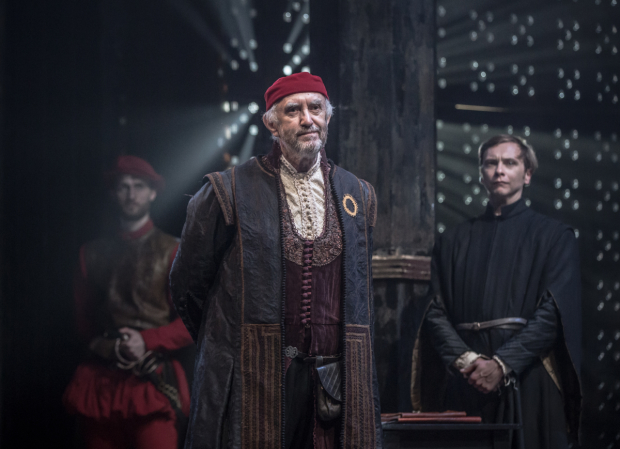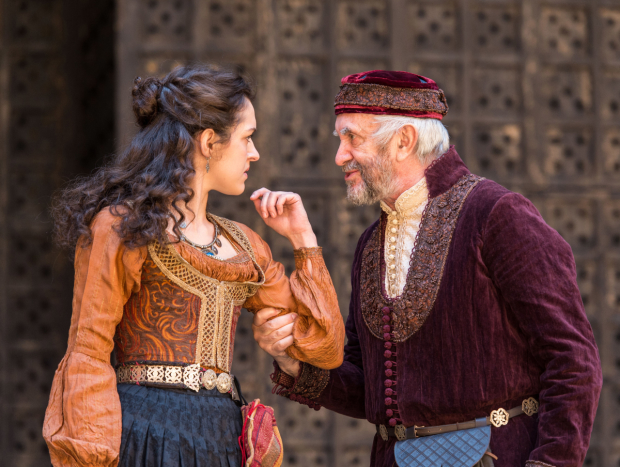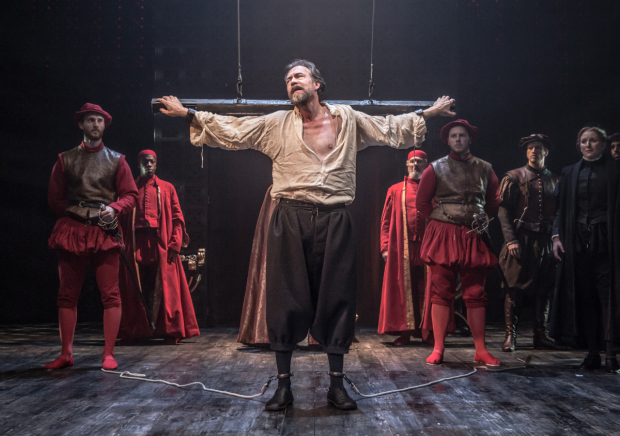The Merchant of Venice

(© Marc Brenner)
When Jonathan Pryce takes the stage in the Shakespeare's Globe production of The Merchant of Venice, time stops. As the much maligned yet ethically questionable Jewish moneylender Shylock, Pryce's multifaceted performance is so nuanced that he dominates Jonathan Munby's 2015 mounting of this troublesome "comedy," presented in New York by the Lincoln Center Festival before embarking on a brief American tour. When he's not onstage, though, the nearly three-hour evening has a tendency to sag.
The titular figure is Antonio (Dominic Mafham), who, in an effort to help his dear friend Bassanio (Dan Fredenburgh) gather enough funds to woo the beautiful and wealthy Portia (Rachel Pickup), agrees to a particularly grim bargain with Shylock. Shylock will lend Antonio 3,000 ducats to give to Bassanio, but if Antonio cannot pay the sum back by an appointed date, Shylock will cut off a pound of Antonio's flesh.
The Merchant of Venice is one of the more difficult Shakespeare plays to stage effectively, shifting back and forth between the drama of Shylock, the comedy of two flamboyant suitors trying to woo Portia, and a trio of romances: between Shylock's daughter, Jessica (Phoebe Pryce, the leading man's talented daughter), and the Christian Lorenzo (Andy Apollo); Bassanio and Portia; and Portia's lady-in-waiting Nerissa (Dorothea Myer-Bennett) and Bassanio's friend Gratiano (Jolyon Coy).
There's also the long-standing question as to whether the play reflects an anti-Semitic world, or whether the play itself is anti-Semitic. To be the latter, Shylock has to be portrayed as a villain, who gets a just punishment at the end when he is stripped of his faith and forced to convert to Christianity. To be the former, Shylock has to be presented as a tragic figure whose disdain for society comes after years of vitriolic abuse. These questions have plagued scholars for generations, and there are no easy answers, only theatrical interpretations.

(© Marc Brenner)
Munby's vision sees Venice as decidedly unsympathetic. The Jewish characters don red skullcaps, as was the law at the time to distinguish them from the rest of society. This production even opens with an assault on two Jewish men who are spit on and kicked in front of a crowd. As Shylock and Antonio debate the terms of their agreement, Shylock's prayer book is viciously tossed on the floor, his beard grabbed with force by Antonio.
Yet Pryce's Shylock is more than a victim; in fact, he's at turns scary and violent, to go along with the overwhelmingly heartbreaking quality at the core of his performance. The famous "Hath not a Jew eyes" speech aches with vulnerability, but Pryce also goes for the jugular, especially when Antonio is forced to default on his debt. It's a brave take on the role, one that is unafraid to play up Shylock's moral ugliness, while also calling for tears when necessary.
During Pryce's offstage scenes, however, this Merchant of Venice is disappointingly black-and-white. The romantic moments between the lovers never quite gel, with far too many of the performers fading into the background of Mike Britton's sepulchre of a set (Britton also provides the opulent costumes, one of which makes Pryce resemble his Game of Thrones character, the High Sparrow). Only in the climactic trial scene, where Portia disguises herself as a male lawyer to defend Antonio against Shylock's accusations, does this production come to life as a whole. Pickup expertly controls this particular section with great force, her "Quality of Mercy" speech delivered with elegance.
A major invention for this production, one that will not easily be forgotten, is an added epilogue, in which we watch Shylock's fate play out before our very eyes. On the other side of the stage, Jessica cries out a prayer in Hebrew, realizing that she never truly can escape her upbringing and the prejudices against it. It is an unbearably painful moment, one that, based on our knowledge of history, echoes loudly throughout the following generations. Sadly, it continues to do so.

(© Marc Brenner)











